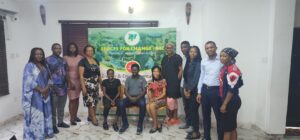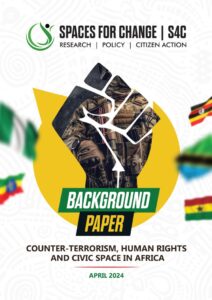Spaces for Change | S4C and Divine Era Development and Social Rights Initiative (DEDASRI) have just concluded a week-long learning exchange program (LEP) facilitated by the Civic Space Resource Hub for West Africa (CSR-Hub). Throughout the month of June, the learning exchange program involved many nonprofit organizations across Nigeria. Just as S4C and DEDASRI’s learning exchange was taking place in Lagos, South-West Nigeria, Friends for Community Development and Youth Empowerment paired with the Accountability Lab in Abuja, North-Central Nigeria while the Center for Legal Orientation and Humanitarian Aid partnered with CITAD in Kano, North-West Nigeria.
The LEP adopts a mutually-beneficial approach to enhance experiential learning and collaboration between non-profit organizations. It brings together well-established non-profit organizations that have been in existence for over 10 years (called mentors) with younger organizations that are less than 3 years old (called mentees). From the point of orientation to the close-out sessions, mentee organizations directly observed and learned about the day-to-day operations of a non-profit while also gaining practical insights into the operational and management processes for translating their vision and mission into action.
CSR-Hub’s learning exchange program comprises five key segments: Organizational Management, Administration, Internal Governance, Organizational Policy Development, and Organizational Policy Enforcement. During the five sessions, mentees observed and received training on the daily work routines of nonprofit organizations from the point of sign-in to project design and implementation, internal and external communications, data protection, financial management, administrative procedures, and personnel administration. Mentees also learned about the tools and software that aid financial transparency, reporting, auditing, and archiving. The importance of developing and implementing sound internal policies pertaining to all aspects of the organization’s charitable operations was also emphasized. The exchange program concluded with a session dedicated to fundraising, financial resilience, and institutional sustainability, equipping mentees with tested ideas and strategies for sustaining their organization’s financial base.
At the end of the program, mentee organizations acknowledged that the LEP not only expanded their understanding of non-profit management but motivated them to set new goals for improving their organizational policies and governance processes. Some have already commenced major institutional changes based on the lessons learned during the program. They realized that the more they institutionalize their operations, the more they are able to undertake far-reaching interventions that make a lasting impact in their communities. By sharing their expertise, institutional journeys, and experience, the mentors too, play a major part in strengthening the resilience of younger organizations to weather the storm of shrinking civic space in the Nigeria and the West Africa subregion at large. More exchanges have been scheduled in the last quarter of the year to expand the reach of the CSR-Hub’s institutional strengthening services to more organizations in West Africa.





















